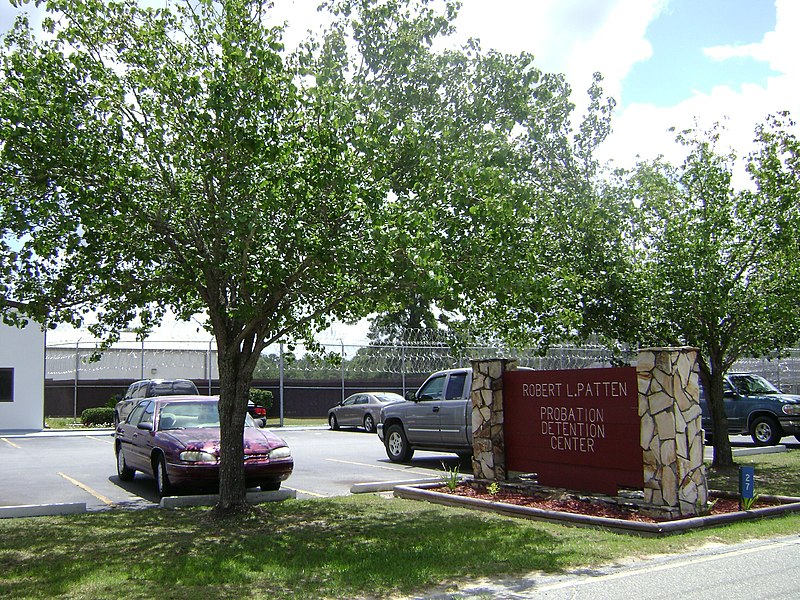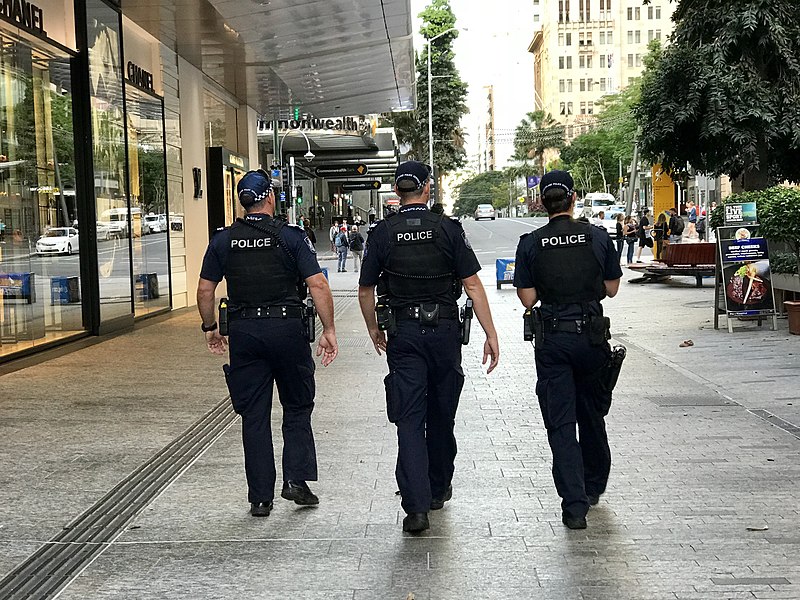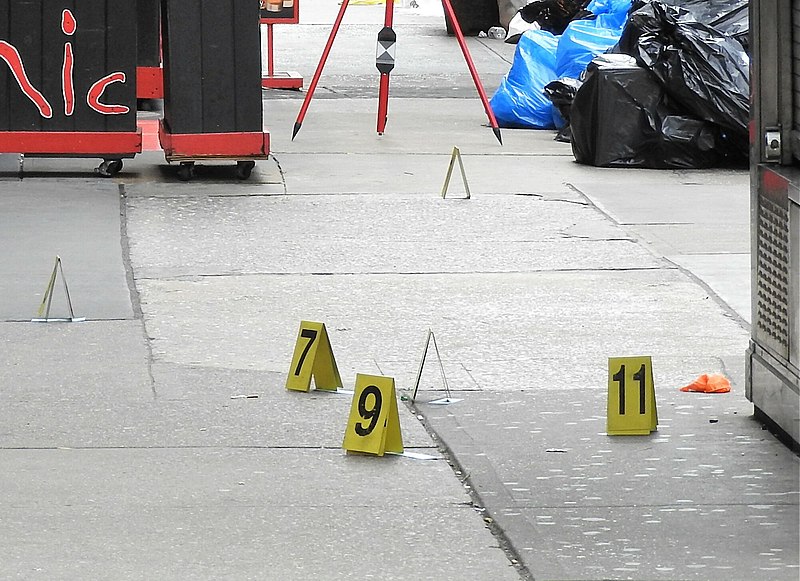A thorough understanding of the American Criminal Justice System is important for anyone willing to join any one of the several US Law Enforcement departments. It should be made clear that a degree in Criminal Justice is not a requirement for becoming a police officer, but it most certainly helps. A bachelor’s degree in criminal justice will increase your chances of getting the job, but that’s not all. It will also allow you to apply for higher ranking posts in the applicable departments of law enforcement.
If your resume is good enough, you will be considered for promotions ahead of peers without the preferred higher qualifications. All that being said, it is not just the police department that is being discussed here. There are several other opportunities in the field of criminal justice as well and we will be exploring some of the more prospective ones next.
The Police Force
The US Police Department has numerous divisions and completing your bachelor’s opens the door to almost all of them. Even if the particular job role only needs their applicants to be high school graduates, you will be preferred as a candidate if you have an actual understanding and background in criminal justice. As for the various types of policing jobs that there are in the US, here’s a brief list to consider:
Uniformed (Regular) Police Officer
Uniformed police officers form the bulk of the police force in US, which is why the rate of recruitment is also the highest here. If you have an affinity towards maintaining Law & Order, keeping the peace, serving justice, maintaining traffic safety, and protecting people, this is where you should start. Uniformed police officers earn around $67,300 per year on an average, but their maximum work hours can far exceed the expected. It will always be a part of the job description if you decide to work in the field of criminal justice.
Detective or Police Investigator
Detectives outrank the regular uniformed officers and, just as the title suggests, they are crime investigators. While they can most certainly wear their police department’s uniform, that is usually not the decorum. If you have ever seen a single cop show, you probably know how a detective dresses exactly; suited and booted.
Under normal circumstances, the only steps to become a police detective are to:
- Go through the Police Academy
- Join the police force and gain some experience
- Apply for the departmental detective examination
- Pass it and qualify for the interview
- Pass the interview and come out as a certified police detective
As we can see here, it isn’t a job for the rookies, but it’s an opportunity that will eventually open up to them as well. Note that if you are a cop with decent experience under your belt, you should ideally get an online criminal justice degree before applying for the promotion.
Not only will you be preferred during the interview, but you will find the examination to be a lot easier too. If your department is in Kansas, this online criminal justice degree from the Central Christian College of Kansas should be well suited for the job. If you decide to complete your graduation in criminal justice later, do make sure that your specialization is directly related to your preferred investigative department.
For example, homicide detectives and narcotics detectives deal with completely different types of scenarios, although their work and experiences do overlap often. During graduation, you should be able to find specialization options for the various types of detective work.
Sheriff
The role of the county sheriff can be an electoral position or a position of appointment, depending on the county we are discussing. Their responsibilities are quite similar to a police chief, but in some counties, their power extends even further into administrative territories. Any officer could be elected as the sheriff by their county residents, where the election system exists. Otherwise, they would simply be appointed by the former sheriff, the mayor, or some other influential, government party. Qualifications do hold value and a senior officer with bachelor’s degree in criminal justice will have an edge, even if it is decided via election. However, there is little doubt about the fact that public influence and experience plays a bigger role here than academic qualifications. The salary of a sheriff will differ vastly, depending on the county itself.
Fish and Game Warden
A fish and game warden is like a forest ranger in many ways, and they will usually work in cooperation with each other. However, a forest ranger does not necessarily deal with criminal justice, while a fish and game warden does. Poaching, trespassing, animal attacks, animal cruelty, etc. are always overseen and investigated by the fish and game wardens first.
Unlike the forest ranger’s department which exclusively caters to peacekeeping and handling of problems within the forest, a fish and game warden will typically intervene when a conflicting situation is created between human beings and nature. You will be called to catch wild animals often, so it is ideal if you have sufficient training and experience with animal control as well. Hunting, shooting, fishing, swimming, climbing, etc. are all necessary outdoor skills that a fish and game warden should possess.
Fire Investigation
A degree in criminal justice is highly advisable for anyone who wishes to become a fire investigator. Although this is a very niche job, their role is extremely important to even police detectives. Unlike the fire fighters, the fire investigator is called in after the fire has been extinguished. They will look around, collect forensic evidence, and investigate to find out all they can about a fire.
Often hired by insurance companies and local police departments suspecting arson, they determine the origin of a fire. They help the people in charge decide whether the fire was an act of voluntary arson, or accidental. Even if it is accidental, how and why did the accident happen? Is there a responsible party? These are some of the many questions which a fire investigator is responsible for solving. If you have a fascination with fire, or you are a former fire fighter, it will help.
Forensic Investigator
Crime lab assistants need to complete a degree in criminal justice and forensic science to even be qualified for the job. They generally come from a background of pure science, but with further training on how to maximize their knowledge and expertise to help catch criminals. From determining blood spray patterns and finding hair samples, to simply scanning for fingerprints, the jobs of a forensic investigator and a crime scene investigator are most certainly interesting.
Having said that, crime scene investigators do face the most horrific crime scenes, which is why this is only a job for people with the right mental fortitude to see them for decades without flinching. CSI is a TV show which managed to portray at least the investigative parts quite appropriately, so if you want to become a crime scene investigator, or even a forensic investigator, that is not a bad show to get some idea of what the job entails!
The Federal Bureau of Investigation (FBI)
Pop culture has made the FBI famous, although they may not always be portrayed in the most realistic manner. Nevertheless, even the entry level FBI agents are federal officers who outrank any local law enforcement department. They intervene, take over, and investigate only the most serious, complex, or classified cases. If the threat isn’t particularly big, just one or two FBI agents might be sent to work in collaboration with the local law enforcement department.
To become a federal agent, a bachelor’s degree is the minimum requirement in terms of academic qualifications. Most agents are recruited from other law enforcement departments of the United States because experience is also a necessary requirement here. Given that the FBI investigates everything from serial killers and powerful gangs to terrorist activities and cybercrime, the need for higher qualifications and proper experience does make a lot of sense. Check out rest of the qualifications here on the official FBI website.
The Central Intelligence Agency (CIA)
Both the FBI and the CIA are federal government departments with immense power in their respective jurisdictions. However, that is exactly where the difference between the two federal departments exists. The CIA primarily operates outside the United States to gather intel on all points of interest. It would be impossible to state what and who exactly the CIA deems to be a point of interest, but the main objective that drives the agency is the protection of national security from external threats.
If an external threat has already infiltrated the nation, or has gained significant influence inside the nations, then they may expand their jurisdiction to include locations of interest as well. The CIA will often work with the FBI and other, federal/local law enforcement departments to achieve their objectives and eliminate threats to national security. Being the first line of defense for the country, the intelligence agency will often pass random, but extremely crucial bits of information to other law enforcing departments, if they consider it to be necessary for maintaining peace.
CIA agents do get paid more than FBI agents, but there isn’t a hierarchy between the two. Recruitment requirements are not fully disclosed, but the academic requirements, and the need for experience are very similar. In other words, if you wish to be a top-secret international spy for the United States, you will have to work for the CIA!
Private Investigation (PI)
PIs are usually retired police or military police detectives, but they are not the exclusive professionals to get into the job. In fact, there is no specific requirement to apply for a PI’s license, but it will help if you have a background in law enforcement. At least complete an online criminal justice degree, before applying for a PI’s license. Even voluntary experience in police investigations can help you get started, but a PI without any prior experience in the law enforcement profession is not something that you should attempt.
The job usually entails finding people, following people, taking pictures, recording audio/video content, gathering proof, and more. Now, being a PI in real life is not always about upholding the law, as your clients will in most cases be private citizens. Nevertheless, you will still need to have a proper understanding of the law, and make sure that neither your client, nor your establishment gets caught up in anything illegal.
From finding proof of infidelity to aid divorce cases to helping lawyers gather proof to build a compensation claims case, the job will be varied to say the least. In time, private detectives do develop a specialty of their own. Private investigators with a history of police work may often freelance with the local police department as well, especially if they gain a good reputation.
Corporate Investigation (CI)
The highest paid private investigators are almost invariably corporate investigators. Large corporations can and do pay a lot of money to the right men/women with the right skills to get dirt on their competitors, investigate against compensation claims, collect proof for lawsuits launched by them, and a lot more. They cannot technically go past the law and its limitations either, but there are a lot of fuzzy lines in this field.
Only the best private investigators are chosen by corporate clients, and their recruitment policy is not dissimilar to how they recruit any of their other employees. Your employability as a CI will depend on how qualified you are in criminal justice, your experience during and before the PI business, and your record in the type of job(s) that they have in mind for you.
Correctional Officer

https://commons.wikimedia.org/wiki/User:Adam.J.W.C.
- Qualifications: Bachelor’s Degree
- Job growth of 4% is anticipated.
- Jails, prisons, or holding cells at the local, state, and federal levels are possible workplaces
- Salary on Average: $40,530
Correctional officials are responsible for keeping order generally while supervising people who are being detained lawfully in jails, prisons, and holding facilities. There is a high danger of harm in this physically demanding work. Some of their duties include screening inmates and visitors for weapons and illegal substances, keeping an eye on inmates’ activities, and inspecting facilities to make sure they adhere to the highest standards of hygiene, security, and safety.
Criminal Profiler
- Degree, either an associate’s or a bachelor’s
- 4% expected job growth
- Government agencies with local, state, and federal employment
- $54,000 is the average salary.
Criminal profilers are special agents of the Federal Bureau of Investigation (FBI) who conduct in-depth analyses to provide detectives with a psychological or physical description of a suspect. By picturing the entire incident and its sequence of events, they can also ascertain a suspect’s intentions.
Crime Prevention Specialist
- Degree, either an associate’s or a bachelor’s
- Job growth of 4% is anticipated.
- Locations of Employment: Local Communities
- 52,00 average annual salary
Specialists in crime prevention collaborate closely with local governments to assist them develop plans and methods for reducing crime. They are in charge of suggesting methods for making communities more crime-ready and for insuring or putting in place more trustworthy security, such as neighborhood watch.
Investigator for crime scenes
- Qualifications: Bachelor’s Degree
- Job Growth Predicted: 19% Increase
- Workplaces: Offices, Laboratories, and Crime Scenes
- $56,320 on average
The job of a crime scene investigator involves going through every aspect of a crime scene and gathering evidence like DNA and fingerprints. They also help the criminal profiler determine the precise circumstances surrounding the incident.
Agent of the Drug Enforcement Administration
- Qualifications: Bachelor’s Degree
- Job growth of 7% is anticipated.
- State, local, and federal law enforcement agencies are potential employers.
- Salary on average: $77,210
Drug Enforcement Administration (DEA) agents actively contribute to the fight against drugs by upholding the law on prohibited substances and halting the trafficking of illicit drugs. In addition to conducting domestic investigations, DEAs also undertake international investigations and collaborate closely with Border Patrol and Customs Enforcement agents when domestic investigations are involved.
Homicide Detective
- Degree, either an associate’s or a bachelor’s
- Job growth of 4% is anticipated.
- Positions Available: Local, State, and Federal
- Salary Range: $79,620 to 119,280
A homicide detective’s responsibility is to gather and examine evidence and cues left at crime scenes to identify murder suspects. Things like DNA and fingerprints may be among these proofs or hints.
Jail Screener
- Associate degree is necessary for education.
- Job growth of 6% is anticipated.
- Jails and prisons at the local, state, and federal levels
- Salary on average: $41,000
Jail Screeners carefully examine convicts’ conduct to modify and process their punishments. Their study is crucial because it establishes whether or not a convict will cope with being released back into society.
Probation Officer

https://commons.wikimedia.org/wiki/User:Mjrmtg
- Qualifications: Bachelor’s Degree
- Job Growth Predicted: 18% Rise
- Positions Available: State or Federal Government
- $54,050 on average
Convicted offenders who get a probationary sentence rather than a jail term are supervised by probation officers. To make sure the offender is abiding by all the conditions of their probation, they maintain constant contact with both the offender and the offender’s family.
Narcotics Officer
- Degree, either an associate’s or a bachelor’s
- Job growth of 4% is anticipated.
- Small towns and the federal government are places of employment
- Salary on average: $77,210
The goal of narcotics officers is to stop the use, sale, and distribution of illicit substances. This includes inquiries into drug trafficking and possession. Some of the tasks and resources include surveillance, K9 units, wiretaps, and covert work.
Parole Officer
- Qualifications: Bachelor’s Degree
- Job growth of 4% is anticipated.
- Locations of Employment: County or State Parole Offices
- Salary on average: $49,360
The primary responsibility of parole officers is to keep an eye on offenders who are released from custody to make sure they do not get into trouble again and wind up back in jail. They accomplish this by assisting them in locating housing, career opportunities, and other necessities for their recovery.
State Trooper

https://commons.wikimedia.org/wiki/User:SKopp
- Degree, either an associate’s or a bachelor’s
- Job growth of 5% is anticipated.
- Locations for Employment: Local and State Highways
- Typical Salary: $58,320
On local and state roadways, state troopers endeavor to enforce traffic and safety rules. Some of their duties include keeping an eye on highways and roads, writing fines and penalties for moving violations, and helping out in motorbike and car accidents.
Youth Correctional Counselor
- Qualifications: Bachelor’s Degree
- Job growth of 4% is anticipated.
- Government jobs at the state or federal level
- $54,080 on average
To aid juvenile offenders in becoming productive members of society, youth correctional counselors work closely with them in prisons. Their primary duty is to provide individual and group counseling to young offenders to prevent them from committing more offenses that could result in jail in the future.
Officer of the National Security Agency Police

https://commons.wikimedia.org/wiki/User:Kgbo
- Degree, either an associate’s or a bachelor’s
- Job Growth Predicted: Variable Dependent on Federal Budget
- Locations for Employment: National Security Agencies
- Typical Salary: $53,300
An NSA police officer’s main responsibility is to protect NSA resources. They provide NSA workers with weapons training, police NSA property with firearms, and support counterterrorism activities.
Computer Forensic Specialist
Specialists in computer forensics retrieve information and materials from laptops, cell phones, and other digital devices. To restore destroyed data and fix damaged files, they rely on software tools and cybersecurity strategies. Law enforcement employs computer forensic specialists to acquire data on illegal activity, produce reports based on that data, and testify in court. A bachelor’s degree in criminal justice or computer science is frequently held by computer forensic specialists.
Forensic Accountant
Forensic accountants carry out investigations and look for signs of fraud. They analyze financial facts and testify as experts in court cases while working in the insurance, banking, and law enforcement sectors. Forensic accountants who collaborate with law enforcement agencies find evidence of white-collar crimes including theft, money laundering, and the concealment of assets. They occasionally use analytical tools to find fraud. A bachelor’s or master’s degree in accounting or a closely related discipline, such as forensic accounting, finance, or criminal justice, is typically required for employment.
Forensic Psychologist
Forensic psychologists use their understanding of psychology to analyze crimes and judge offenders. They collaborate with law enforcement to develop criminal profiles, assess a suspect’s capacity to stand trial and carry out psychological studies. To comprehend the convicts’ intentions, identify any mental health conditions, and provide reports that the courts can utilize to determine punishment, forensic psychologists may also examine detainees. A Ph.D. in counseling or psychology and a state-issued license is frequently necessary for careers in forensic psychology.
Juvenile Counselor
Nobody is a criminal by birth. Not everyone receives the direction they require to make the right decisions, and young people in particular need assistance navigating what can be a difficult environment. Counselors for children can help in this situation. To help disturbed children, find a better path, juvenile counselors work with them in both schools and detention centers. This entails providing children and their families with coping mechanisms and the tools they need to deal with challenges that may have previously made them feel helpless.
Crime Scene Technician

https://commons.wikimedia.org/wiki/User:Jim.henderson
Although you have just seen them on television, they perform much more in real life. Crime scene technicians, often referred to as crime scene investigators, gather information such as fingerprints, evidence from weapons, and other materials that may lead to an arrest and criminal prosecution. They must also keep detailed records for use in court hearings and bring evidence to crime laboratories for additional investigation.
There are hardly any jobs within the criminal justice department that do not pose a potential threat to personal safety. Before you take up the responsibility to serve others, understand those risks. Make sure that you are indeed someone who is willing to take the risks necessary, if that risk is necessary to keep people safe. These are all honorable jobs, only meant for the brave, intelligent, and strong members of the population.



